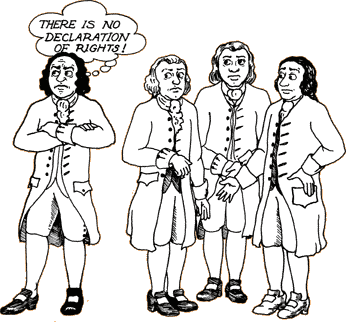|
READ AND DISCUSS
George Mason was one of three delegates who refused to sign the United States Constitution. While still at the Convention, he took his draft of the Constitution and wrote down his objections on the back of it.
Mason's objections, along with articles by others in support of the Constitution, appeared in newspapers throughout the country in the months to come. These pieces were probably read by representatives in each state who were deciding whether or not to ratify the Constitution. The man on the street probably read these essays, too, and wondered, "Will we ever agree on our new government?" The major points of Mason's document, rewritten in modern language, appear on the following pages.
ACTIVITY
(in small groups)
Each group reads one of the objections. Come up with a group response to the question. Write a summary of Mason's objection and the answer to your group's question on a large sheet of paper titled, "I Object!, Says Mason." Share this with the class.
|
16 September 1787
OBJECTIONS TO THIS
CONSTITUTION OF GOVERNMENT
1. There is no declaration of rights. It is true that many states have their own bill of rights. However, the central government is more powerful than any one state. For this reason, the people need to be protected from an unjust central government by a bill of rights for the entire country.
|
Question: Do you think a national bill of rights is important? Are the rights of citizens in danger without a national bill of rights? Why or why not?
2. There is only the shadow of representation in the House of Representatives. The small number of representatives per state will not be able to keep citizens informed about what is happening in the legislature. The laws often will be made by representa- tives who are not affected by the outcome of the law.
|
Background: If this section of the Constitution were approved, Rhode Island and Delaware would only have one representative for their whole state in 1787. The House would be able to vote on laws with only twenty members present! Right before the Constitution was signed, the size of the House of Representatives was enlarged from one representative per 40,000 people to one representative per 30,000 people in each state. Mason admitted that this change "in some degree lessened" his objection to the plan.
Question: Mason was worried that the House of Representatives was too small and that the citizens were not adequately represented. What are the advantages and disadvantages of a small House of Representatives? Make two lists.
3. The President needs to have a council of advisors to give him information and support. Without this council, the President will be influenced by his favorites or by the Senate or by the most powerful men in his departments. All of this is dangerous for a free country.
|
Background: Mason proposed that the council of advisors consist of six members -- two members from New England, two from the middle states, and two from the South. The members would be chosen by the Senate.
Question: Evaluate Mason's plan for a council of advisors to the President. Is this council necessary? If so, who should be on the council? Who should choose its members? Do we have something like this council today?
4. The office of the Vice President is not necessary. Since the Vice President serves as president of the Senate, the powers of the executive and legislative branches are blended. This is dangerous. Also, the office of the Vice President gives one of the states an unjust power over the others.
|
Question: Explain Mason's remark that the office of Vice President makes one state more powerful than the others. Why did Mason think that this would happen?
Find out about the duties of today's Vice President. Do you agree with Mason: Is the office of Vice President unnecessary? Why or why not?
5. The central government will allow slaves to be sold into the country for at least twenty more years. This makes America weaker and less able to defend itself.
|
Background: Mason believed that the national government should stop the sale of slaves into the country. During the Federal Convention, he said, "Slavery discourages arts & manufactures. The poor despise [hate] labor when performed by the slaves ... [Slavery] produce[s] the most pernicious [harmful] effect on manners. Every master of slaves is born a petty tyrant."
Question: Explain Mason's objection. Think of reasons why slavery made the country weaker. How did slavery make the country less capable of defending itself?
 
|

